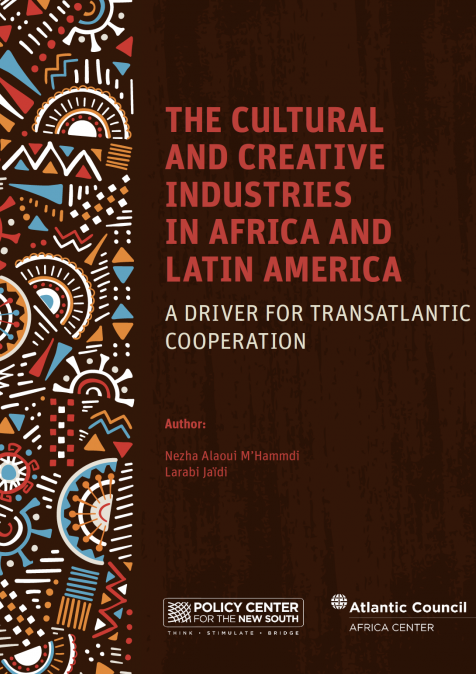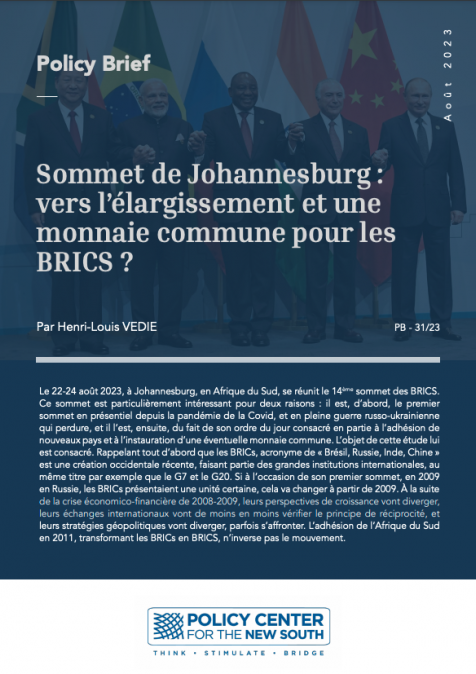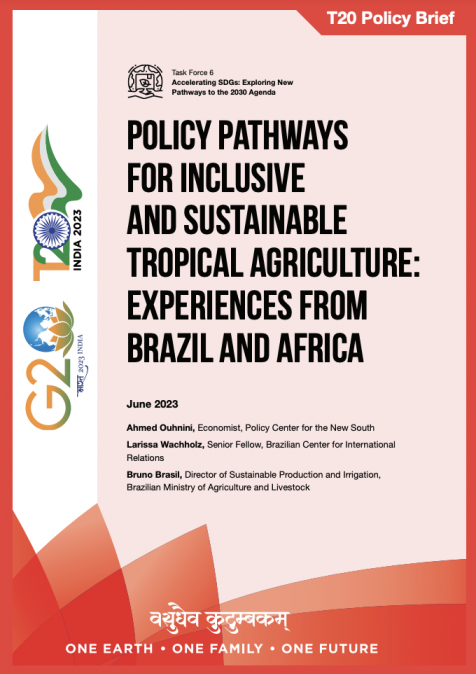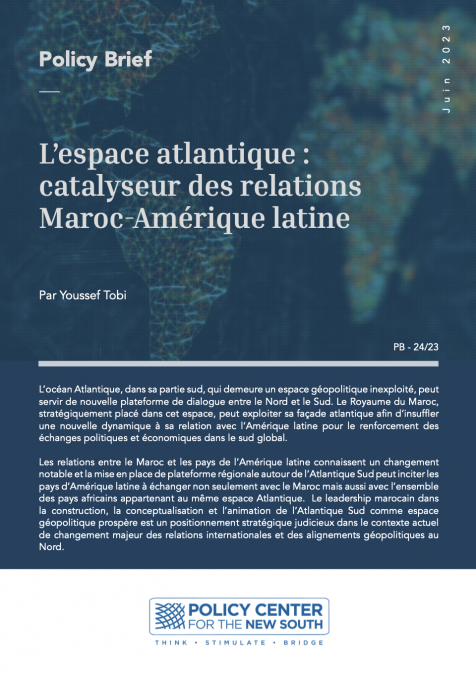When this interview was recorded, Argentina had just sworn in a new president of the Nation, raising many questions about the political future of the South American country. The freshly installed Head of State had led a peculiar campaign, had promised to slash government spending, in a country where half the population receives support from the State. His radical rhetoric against the political elite had galvanized the youth, but also contributed to stoke fear on the future of democracy in Argentina. In this interview, Camila Crescimbeni, former MP and member of the ADEL 2023 cohort, answered questions on her own political engagement and on her perception of what the close future of Argentina might look like.
RELATED CONTENT
-
AuthorsSeptember 15, 2023This report is part of a partnership between the Policy Center for the New South and the Atlantic Council’s Africa Center. The creative economy is a constantly evolving activity, driven by the cultural industries, which make up a large and interconnected sector. Arts and culture impact the creative economy in major areas: education, innovation, collaboration, and clustering. The cultural industries are one of the most rapidly growing sectors of the global economy. This sect ...
-
September 1, 2023In our discussion with Alejandro Werner, Founding Director of the Georgetown Americas Institute, he shares insights from his experiences in Latin America. Werner highlights the impactful policies and reforms that have championed inclusive growth. Additionally, he delves into the challen...
-
by Hala Boumaiz & Len IshmaelSeptember 01, 2023In this podcast, we are joined by Dr. Len Ishmael, editor and co-author of the book “Aftermath of War in Europe: The West VS. the Global South?”. Dr. Ishmael delves into the groundbreakin ...
-
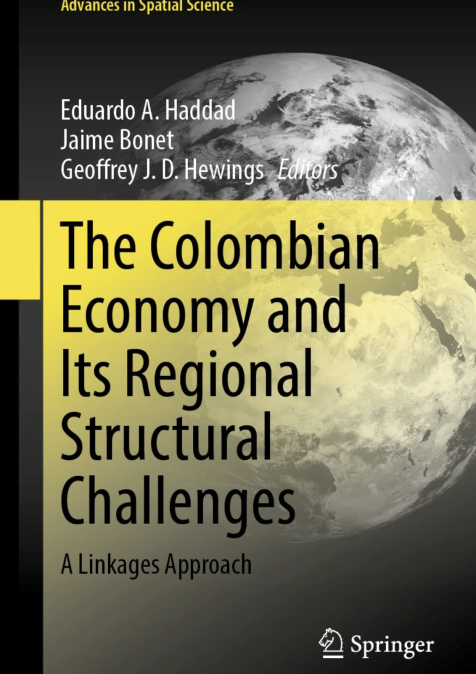 AuthorsAugust 30, 2023This Book was originally published on springer.com This book examines regional structural challenges on Colombia’s path to sustainable social cohesion and regionally inclusive growth. These challenges can be divided into three main groups: (i) those that focus on competitiveness and the supply side, (ii) those that arise from critical business cycle issues on the demand side, and (iii) those concerning environmental sustainability, employment and social inclusion.  ...
AuthorsAugust 30, 2023This Book was originally published on springer.com This book examines regional structural challenges on Colombia’s path to sustainable social cohesion and regionally inclusive growth. These challenges can be divided into three main groups: (i) those that focus on competitiveness and the supply side, (ii) those that arise from critical business cycle issues on the demand side, and (iii) those concerning environmental sustainability, employment and social inclusion.  ... -
 AuthorsAugust 29, 2023At the August 22-24 BRICS summit in Johannesburg, the leaders of Brazil, Russia, India, China and South Africa said they wanted to use more of their national currencies for cross-border payments, which are currently dominated by the U.S. dollar and other global convertible currencies. Like China and the other BRICS, several other countries have also sought to develop alternative external payment mechanisms. Pairs of countries have agreed to settle commercial and financial transactio ...
AuthorsAugust 29, 2023At the August 22-24 BRICS summit in Johannesburg, the leaders of Brazil, Russia, India, China and South Africa said they wanted to use more of their national currencies for cross-border payments, which are currently dominated by the U.S. dollar and other global convertible currencies. Like China and the other BRICS, several other countries have also sought to develop alternative external payment mechanisms. Pairs of countries have agreed to settle commercial and financial transactio ... -
AuthorsAugust 22, 2023Le 22-24 août 2023, à Johannesburg, en Afrique du Sud, se réunit le 15ème sommet des BRICS. Ce sommet est particulièrement intéressant pour deux raisons : il est, d’abord, le premier sommet en présentiel depuis la pandémie de la Covid, et en pleine guerre russo-ukrainienne qui perdure, et il l’est, ensuite, du fait de son ordre du jour consacré en partie à l’adhésion de nouveaux pays et à l’instauration d’une éventuelle monnaie commune. L’objet de cette étude lui est consacré. Rappe ...
-
AuthorsJune 20, 2023This policy brief was originally published on T20 India website Supportive policies for tropical agriculture have helped millions of small-scale farmers in Brazil step out of poverty by improving government capacity to design legal frameworks to strengthen agricultural production and family farming. Scientific and technological developments have enabled small-scale Brazilian farmers to produce food while considering local tropical conditions. In contrast, tr ...
-
Hamza M’jahed and Elena Sanchez-MontijanoJune 09, 2023In this podcast episode, we delve into the complex and diverse topic of migration and integration in Atlantic Latin America. As we explore the historical events and patterns of migration ...
-
AuthorsJune 2, 2023L’océan Atlantique, dans sa partie sud, qui demeure un espace géopolitique inexploité, peut servir de nouvelle plateforme de dialogue entre le Nord et le Sud. Le Royaume du Maroc, stratégiquement placé dans cet espace, peut exploiter sa façade atlantique afin d’insuffler une nouvelle dynamique à sa relation avec l’Amérique latine pour le renforcement des échanges politiques et économiques dans le sud global. Les relations entre le Maroc et les pays de l’Amérique latine c ...
-
Hamza M’jahed & Bruno TheodoroMay 26, 2023In this episode, we go beyond the surface and explore the historical background and significant milestones that have shaped the interactions between Latin America and the European Union. ...

